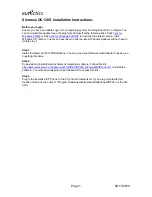
The Root File System and GRUB
97
specified by an offset number of blocks, followed by the number of blocks from that offset point. Block
offsets are listed sequentially in a comma-delimited list.
The following is a sample blocklist:
0+50,100+25,200+1
This sample blocklist specifies a file that starts at the first block on the partition and uses blocks 0
through 49, 100 through 124, and 200.
Knowing how to write blocklists is useful when using GRUB to load operating systems which require
chain loading. It is possible to leave off the offset number of blocks if starting at block 0. As an
example, the chain loading file in the first partition of the first hard drive would have the following
name:
(hd0,0)+1
The following shows the
chainloader
command with a similar blocklist designation at the GRUB
command line after setting the correct device and partition as root:
chain1
9.4.3. The Root File System and GRUB
The use of the term
root file system
has a different meaning in regard to GRUB. It is important to
remember that GRUB's root file system has nothing to do with the Linux root file system.
The GRUB root file system is the top level of the specified device. For example, the image file
(hd0,0)/grub/splash.xpm.gz
is located within the
/grub/
directory at the top-level (or root) of
the
(hd0,0)
partition (which is actually the
/boot/
partition for the system).
Next, the
kernel
command is executed with the location of the kernel file as an option. Once the
Linux kernel boots, it sets up the root file system that Linux users are familiar with. The original GRUB
root file system and its mounts are forgotten; they only existed to boot the kernel file.
Refer to the
root
and
kernel
commands in
Section 9.6, “GRUB Commands”
for more information.
9.5. GRUB Interfaces
GRUB features three interfaces which provide different levels of functionality. Each of these interfaces
allows users to boot the Linux kernel or another operating system.
The interfaces are as follows:
Note
The following GRUB interfaces can only be accessed by pressing any key within the three
seconds of the GRUB menu bypass screen.
Summary of Contents for ENTERPRISE LINUX 5 - VIRTUAL SERVER ADMINISTRATION
Page 12: ...xii ...
Page 20: ......
Page 30: ...12 ...
Page 32: ...14 ...
Page 82: ...64 ...
Page 106: ...88 ...
Page 122: ...104 ...
Page 124: ...106 ...
Page 126: ......
Page 132: ...114 ...
Page 168: ...150 ...
Page 182: ...164 ...
Page 192: ...174 ...
Page 194: ......
Page 236: ...218 ...
Page 238: ...220 ...
Page 270: ......
Page 274: ...256 ...
Page 278: ...260 ...
Page 292: ...274 ...
Page 294: ......
Page 300: ...282 ...
Page 304: ......
Page 316: ...298 ...
Page 370: ...352 ...
Page 384: ...366 ...
Page 385: ...Part VII Appendix ...
Page 386: ......
















































